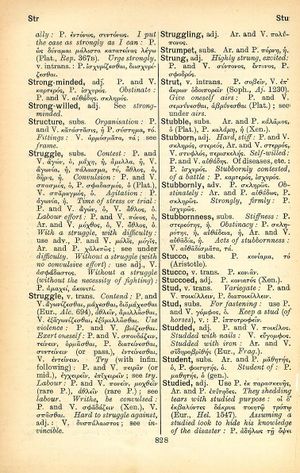studded: Difference between revisions
From LSJ
ὥσπερ γὰρ ζώου τῶν ὄψεων ἀφαιρεθεισῶν ἀχρειοῦται τὸ ὅλον, οὕτως ἐξ ἱστορίας ἀναιρεθείσης τῆς ἀληθείας τὸ καταλειπόμενον αὐτῆς ἀνωφελὲς γίνεται διήγημα → for just as a living creature which has lost its eyesight is wholly incapacitated, so if history is stripped of her truth all that is left is but an idle tale | for, just as closed eyes make the rest of an animal useless, what is left from a history blind to the truth is just a pointless tale
m (Text replacement - "<b class="b2">Frag.</b>" to "''Frag.''") |
m (Woodhouse1 replacement) |
||
| Line 1: | Line 1: | ||
{{Woodhouse1 | {{Woodhouse1 | ||
|Text=[[File:woodhouse_828.jpg|thumb|link={{filepath:woodhouse_828.jpg}}]] | |Text=[[File:woodhouse_828.jpg|thumb|link={{filepath:woodhouse_828.jpg}}]] | ||
===adjective=== | |||
P. and V. [[ποικίλος]]. | [[prose|P.]] and [[verse|V.]] [[ποικίλος]]. | ||
[[studded with nails]]: [[verse|V.]] [[εὔγομφος]]. | |||
[[studded with iron]]: [[Aristophanes|Ar.]] and [[verse|V.]] [[σιδηροβριθής]] ([[Euripides|Eur.]], ''Fragment''). | |||
}} | }} | ||
Revision as of 08:59, 20 May 2020
English > Greek (Woodhouse)
adjective
studded with nails: V. εὔγομφος.
studded with iron: Ar. and V. σιδηροβριθής (Eur., Fragment).

